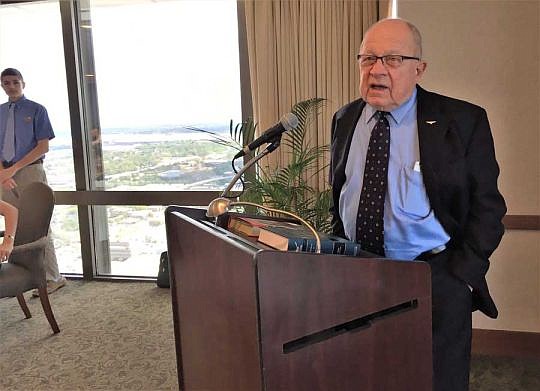
Legendary criminal defense attorney F. Lee Bailey captivated a room of lawyers last week as he talked about his ability to defend clients and cross-examine witnesses without using notes.
Known for his defense work for the Boston Strangler, O.J. Simpson and Dr. Sam Sheppard, it was clear in Friday’s presentation that Bailey has a gifted memory that’s razor sharp at age 84.
“Cross-Examination: Art & Science” took place Friday at The River Club. Marguerite D’Andrea Keller, owner of Precise Reporting Services, sponsored the program. She worked with Bailey for several years.
Bailey regaled his audience of about 70 people with courtroom stories of snatching notes from lawyers he’s worked with or trained over the years.
“Don’t use notes as crutches,” Bailey said. It will interfere with your ability to keep your eyes on the witness.
Have all the facts in your head. Cram them in like you’re studying for the Bar exam, he told the lawyers, noting they should have had plenty of practice.
Cross-examination, he said, is about speed, articulation and astute witness observation to detect inconsistencies. It should determine if they’re telling the truth and reveal what they didn’t see, didn’t hear and don’t know.
It’s a reactive function that requires confidence, determination and discipline, he said.
“You’re not building a block house,” Bailey said. “You’re there to tear it down.”
The process starts with pre-trial preparation, which accounts for about seven-eighths of the work, Bailey said.
Learn the witness’ lingo and form a line of questions to prime and train them, he advised. Keep your eye on the witness so you know if they’re growing uncomfortable and start formulating the question.
“Phrase it and hurl it at them like a fastball,” Bailey said. “The witness will be outrun.”
Bailey blames weak and mediocre cross-examinations for many of the wrongful convictions revealed by programs such as the Innocence Project. He said they have “cast a black eye on the court system.”
“The importance of cross-examination is diminishing, I’m afraid to say,” Bailey stated, attributing it to a lack of training, apprenticeships and hard work.
Bailey, who lost his license to practice law, does trial consulting across the county. His business, Bailey and Elliott Consulting, is based in Portland, Maine.
He didn’t discuss his own legal troubles that began in the 1990s when he was representing French drug smuggler Claude DuBoc.
Bailey was disbarred in Florida and Massachusetts in 2001 for the way he handled 600,000 shares of DuBoc’s pharmaceutical stock. The stock was part of $40 million in mansions, yachts and other assets that DuBoc agreed to forfeit to the government under an unusual, and unwritten, agreement between DuBoc, Bailey and the U.S. Attorney’s Office.
Bailey kept part of the stock for himself, saying it was his fee for defending Duboc and for the oversight and maintenance of DuBoc’s estate.
The stock, which was worth roughly $6 million at the time of the deal, had increased in value to $20 million when the government asked to have it back.
By that time, Bailey had used the money as collateral for a loan. He served 40 days in jail on a civil contempt order until he returned the money to the government.
The DuBoc forfeiture case caused a domino effect of problems for Bailey that led to trouble with the IRS and bankruptcy.
Bailey has written six books, including “The Defense Never Rests.” Published in 1971, it reconstructs three of Bailey’s most famous murder cases, including Sheppard’s.
His legal problems notwithstanding, dementia is what Bailey worries about the most.
To prevent that from happening, Bailey said he exercises his mind by playing online puzzles and watching “Jeopardy!” every night.
“So far it works,” he said.